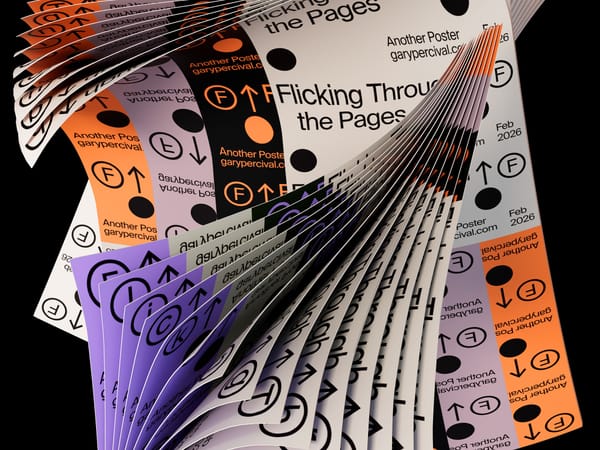Bravery or Belief: How We Rationalise a Lack of Courage
Courage is essential in creative careers, but fear often leads us to rationalise inaction.

As freelancers, graphic designers, and creative professionals, we often find ourselves navigating uncharted waters. Whether it’s pitching to a big client, launching a new project, or experimenting with an unconventional design, these ventures require a significant amount of courage.
However, there are times when fear takes over, and instead of confronting it head-on, we create rationalisations to justify our inaction.
This post delves into how we rationalise a lack of courage, the impact it has on our professional lives, and how we can overcome these self-imposed barriers.
The Nature of Courage and Fear
"Courage is not the absence of fear, but the ability to act despite it." —Desmond Tutu
Fear is a natural response to the unknown and the uncertain, often rooted in a desire to protect ourselves from potential failure, rejection, or embarrassment.
As creatives, our work is deeply personal, and putting it out into the world can feel like exposing a part of our soul. This vulnerability can trigger a range of fears, leading us to find ways to avoid taking risks.
Understanding Rationalisation
Rationalisation is a defence mechanism that allows us to justify behaviours or feelings that we find uncomfortable or unacceptable. When it comes to a lack of courage, rationalisations help us avoid acknowledging our fear and provide seemingly logical reasons for not taking action.
While these rationalisations may offer temporary comfort, they can ultimately hinder our growth and success.
Common Rationalisations for Avoiding Courage
"I'm Not Ready Yet"
One of the most common rationalisations is the belief that we're not ready. We convince ourselves that we need more time to prepare, more experience, or better skills before we can take the plunge. While preparation is important, this mindset can become a perpetual cycle, preventing us from ever feeling ready enough to take action.
How to Overcome It:
- Set realistic goals and deadlines for yourself.
- Understand that growth comes from taking action, not from endless preparation.
- Embrace the idea of learning by doing, and allow yourself to make mistakes along the way.
"It's Not the Right Time"
Timing is often used as an excuse to delay taking action. We tell ourselves that we'll take that leap when the circumstances are perfect, but the perfect time rarely, if ever, arrives. This rationalisation keeps us in a state of inertia, waiting for an ideal moment that may never come.
How to Overcome It:
- Acknowledge that a perfect moment never exists.
- Take incremental steps towards your goal, even if conditions are not ideal.
- Progress is better than perfection, and taking small actions consistently can lead to significant results over time.
"What If I Fail?"
Fear of failure is a powerful deterrent. We worry about the consequences of failing, such as losing credibility, wasting resources, or facing ridicule. To avoid these potential outcomes, we rationalise that it's safer to stick to what we know and avoid taking risks.
How to Overcome It:
- Shift your perspective on failure.
- View it as a learning opportunity rather than a final verdict on your abilities.
- Reflect on your past failures and the lessons they taught you.
- Remember that every successful person has gone through failures at some point.
"I'm Too Busy"
Busyness is a convenient rationalisation that allows us to avoid stepping out of our comfort zones. By filling our schedules with tasks and responsibilities, we can convincingly argue that we don't have the time to take on new challenges.
How to Overcome It:
- Prioritise your goals and manage your time effectively.
- Identify tasks that can be delegated or eliminated to make room for activities that require courage.
- Remember, busyness does not equate to productivity or progress.
"It's Too Risky"
Perceived risk can be paralysing. We often overestimate the negative outcomes and underestimate the potential benefits of taking action. This rationalisation keeps us in a safe but stagnant place, preventing us from seizing opportunities for growth.
How to Overcome It:
- Conduct a realistic risk assessment.
- Consider both the potential downsides and the possible rewards.
- Develop a contingency plan to mitigate risks and boost your confidence in taking action.
- Embrace calculated risks as essential steps towards achieving your goals.
The Impact of Avoiding Courage
Rationalising a lack of courage can have profound effects on our professional and personal lives. It limits our potential, stifles creativity, and prevents us from reaching our goals. Here are some ways it can impact us:
Stalled Growth
Avoiding courageous actions can lead to stagnation. When we choose safety over risk, we miss out on opportunities for growth and development. This can result in a lack of progress in our careers and creative pursuits.
Missed Opportunities
Opportunities often come with an element of risk. By rationalising our fears, we may pass up chances to collaborate on exciting projects, work with high-profile clients, or explore new markets. These missed opportunities can limit our success and fulfilment.
Reduced Confidence
Consistently avoiding courageous actions can erode our self-confidence. We begin to doubt our abilities and question our potential. This negative self-perception can create a vicious cycle, making it even harder to take risks in the future.
Unfulfilled Potential
When we allow fear to dictate our actions, we fail to realise our full potential. Our creative talents and innovative ideas remain dormant, and we settle for mediocrity instead of striving for excellence.
Cultivating Courage in Creative Careers
So how do we move from rationalisation to genuine courage? Here are some strategies:
Start Small
Build your "courage muscle" gradually. Take small risks regularly—reach out to a dream client, experiment with a new style, or share work-in-progress publicly.
Reframe Failure
View setbacks as learning opportunities rather than personal deficiencies. Each "failure" is data that can inform your next attempt.
Seek Evidence of Capability
Jot down all of your wins, no matter how small. Review client testimonials, project outcomes, and personal growth milestones regularly.
Challenge Your Rationalisations
When you catch yourself making excuses, pause and question them. Is there concrete evidence supporting your hesitation, or is it primarily fear-driven?
Surround Yourself with Courage
Connect with other creatives who take risks. Their stories and successes can inspire and normalise the act of being brave in your career.
Visualise Positive Outcomes
Instead of fixating on what could go wrong, actively imagine positive scenarios. How might your career transform if you take that brave step?
Set Courage Goals
Alongside your professional targets, set specific "courage goals." These might include pitching to a certain number of high-profile clients or launching a personal project you've been hesitating on.
Conclusion
Rationalising a lack of courage is a common and understandable response to fear. However, recognising and addressing these rationalisations is crucial for our growth and success as freelancers, graphic designers, and creative professionals. By understanding the nature of our fears, challenging our rationalisations, and embracing courage, we can unlock our full potential and achieve our goals.
Embrace the discomfort that comes with taking risks, and trust that each courageous step will bring you closer to your dreams.
So, the next time you find yourself rationalising inaction, ask yourself: Is it bravery or belief? Choose courage and watch your creative journey unfold in ways you never imagined possible.



